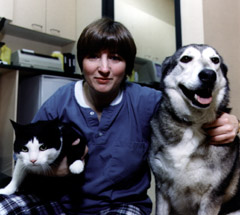 |
Many Animal Health Technicians work in laboratories at universities,
veterinary colleges, and private research centres. Though she’s
worked in similar environments in the past, Cheryl, 35, now does
much the same work with veterinarian Caroline Simard at the Clinique
Vétérinaire Monkland, in a residential area of Montreal. "Caroline
explains everything to me and we do it together. I’m in charge
of ordering medical supplies for the clinic, welcoming clients
at the reception desk, and opening client files. I do all the
testing, such as urinalysis and stool analysis, and prepare blood
samples. I assist in surgery, clean up afterwards, sterilize surgical
kits and supplies, and administer treatments." Then there are
the maintenance chores: cleaning cages, washing floors, and refilling
food and water dishes for boarding animals.
Cheryl and her boss both have their preferences: "I’d rather fight
with a huge dog with a muzzle, and Caroline would rather deal
with cats." Cheryl particularly enjoys the technical aspects of
the job, such as researching animal diseases. Her e-mail moniker
is Eubie, for a Persian cat who died of an enlarged heart. "It
was very sad, but I learned all about that condition. I’m always
learning new things." Euthanizing animals is a big part of the
job. "It’s not pleasant, but when an animal is really sick, it
has to be done. It’s totally painless. They literally go to sleep."
"With every
animal that comes in, I meet a new person. I love to help someone
start out with a new puppy or kitten. I love my job! And I really
enjoy the people in the neighbourhood," says Cheryl.
|
 |


